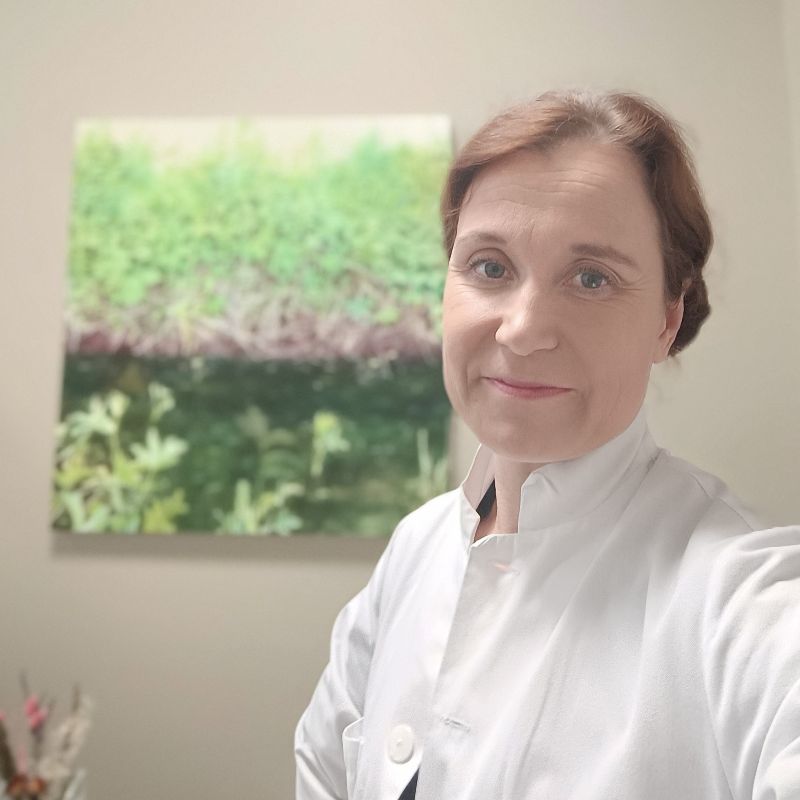Specialist, oral and maxillofacial surgery
"In the healthcare sector, genuine interest in patients and a positive attitude and good interaction skills are essential. If these are in order, the entire work community will usually feel well, and patient care will work well. A lot of changes are constantly taking place in the sector and the working environment can be hectic. However, many problems can be solved in the work community if the team spirit is good and management works."

- Johanna Snäll
- Specialist in oral and maxillofacial surgery, Head Physician at HUS and Assistant Professor at the University of Helsinki.
- Graduated from the University of Helsinki as a Licentiate of Dentistry and Licentiate of Medicine.
- Work experience in the healthcare sector for 20 years.
Briefly explain what you do for a living.
I work as a Specialist in oral and maxillofacial surgery and as a Head Physician at HUS. I also work as an Assistant Professor at the University of Helsinki. In my hospital work, I am responsible for the emergency services in my specialty area, and I work as a supervisor for specialising doctors and dentists. My work at the University of Helsinki includes teaching and research. I am also responsible for specialisation training in oral and maxillofacial surgery.
How have you ended up in the profession of your choice?
The choice of profession has been clear to me, as I have always been interested in natural sciences, the human body and well-being. In addition to thinking, I wanted my work to include concrete work, so I sought to study to become a dentist. Later, I completed a licentiate degree in Medicine to supplement my competence. The combination of two qualifications is a huge help in oral and maxillofacial surgery because it gives me a broader perspective to my current job.
Describe your typical working day or week.
The working day at the hospital always starts with a morning meeting. The meetings will discuss, for example, on-call patients during the weekend and the treatment plans for patients coming for surgery the following week. Some of the mornings are reserved for short trainings.
Hospital work includes outpatient clinic work, i.e. meetings with patients coming by appointment and working in the operating room and inpatient ward. Patient care is planned and specified in different ways during the week. In addition, my work includes administrative work such as planning activities and managing matters related to employment relationships. We also spend a lot of time on improving patient care processes and treatment chains.
Work at the university brings variation to the work at the hospital. However, they have a lot in common, as the tasks of the university hospital include teaching, education and research. Patient care should be based on scientific evidence. My work at the hospital supports my work at the university, as I get ideas for research and teaching from practical patient work.
What kind of work environment or working hours do you have?
I work in a hospital environment. My working hours vary because I do a lot of emergency services. Although the lengths and times of on-call shifts vary, I like these the best.
What kind of competence or qualities are required in the profession?
In the healthcare sector, genuine interest in patients and a positive attitude and good interaction skills are essential. If these are in order, the entire work community will usually feel well, and patient care will work well. A lot of changes are constantly taking place in the sector and the working environment can be hectic. However, many problems can be solved in the work community if the team spirit is good and management works.
The profession of surgeon emphasises problem-solving skills and the ability to make decisions. You must also have good organisation skills and an ability to take action when the situation so requires. In supervisory work, experience in hospital work and a good knowledge of the subordinate tasks help a lot.
What is the best thing about your profession?
The best thing about my profession is the insights and improvements that can be made in healthcare processes. It is great if we can shorten the treatment chain for emergency patients or accelerate the treatment process by using the team's competence and problem-solving capabilities. In addition, individual successes in patient work and working with pleasant colleagues warm my heart.
What are the downsides of the profession or what seems challenging?
In healthcare, there are sometimes injustices, deficiencies or problems that you cannot influence yourself. It is frustrating. In addition, there is sometimes a shortage of resources and unclear operating instructions.
What would you tell a person considering the profession of a medical specialist?
After the basic training of a medical doctor or a dentist, there are a wide range of possibilities for developing your expertise. I recommend that you seek out the fields and tasks that you are most interested in, as this is likely to make you happy with your work. You can have a great impact on your career development by being active. In addition to the hospital world, medical doctors and dentists can work in administrative tasks and outpatient care, as well as in research, education and teaching. There is something for everyone.
How do you see the future of your profession?
The population is ageing, which poses a challenge to healthcare in our country. In the next few decades, we will need enthusiastic, motivated and development-oriented healthcare professionals who always think about the patient's benefit. If we have qualified professionals in the sector, we will have sufficient preconditions to remain a welfare state.
